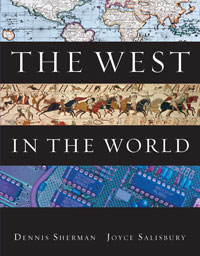 
The West in the World, 4th Edition (Sherman)Chapter 7:
The Struggle to Bring OrderCritical Thinking Questions- Bringing Order with Laws and Leadership
- How did German assemblies determine the truth in disputed cases?
- What were the traditions that Germanic kings drew from once laws began to be written down?
- What did law codes reveal about the worth of various members of society?
- Anglo-Saxon England: Forwarding Leaning and Law
- Who was the Venerable Bede? What were his contributions to Anglo-Saxon learning?
- How did Christian Anglo-Saxon kings govern? What were the traditions and institutions that they relied upon?
- What benefits did Alfred's interest in law and learning bring to his kingdom?
- Charlemagne and the Carolingians: A New European Empire
- How did Charlemagne depart from the Anglo-Saxon model and Germanic traditions of governance?
- How did Charlemagne link religion and politics?
- How would you characterize Charlemagne's relations with the Byzantine and Islamic empires?
- How did Charlemagne foster learning in his kingdom? What was the role of Alcuin?
- How did scholars at Charlemagne's court contribute to text reform? Why was that important?
- Struggle for Order in the Church
- What services and benefits did monasteries provide for their communities?
- What was the Cluniac reform?
- Order Interrupted: Vikings and Other Invaders
- What was the Treaty of Verdun?
- How did the division of Charlemagne's kingdom among his grandsons create changes in the once-unified empire?
- What characteristics did the Scandinavians share with earlier Germanic peoples?
- Why did Scandinavians emigrate? What skills did they possess that enabled emigration?
- How did Vikings interact with the peoples they encountered in their travels and conquests?
- What was the impact of Muslim, Magyar, and Viking invasions on medieval European society?
- Manors and Feudal Ties: Order Emerging from Chaos
- How do historians distinguish "manorialism" from "feudalism"?
- Describe a typical manor. How was life organized on a manor?
- What were the duties and obligations of serfs? What were the duties and obligations of lords?
- How did lords oversee and control the social life of their serfs?
- How did Charles Martel solve the problem of establishing an army of armed and mounted knights?
- What did vassals owe their lords? What did lords owe their vassals?
- What were the benefits of the feudal system for medieval society? What were the disadvantages?
- What was the significance of marriage ties in the feudal system?
- What were medieval beliefs about health and medicine?
 |  |
|





